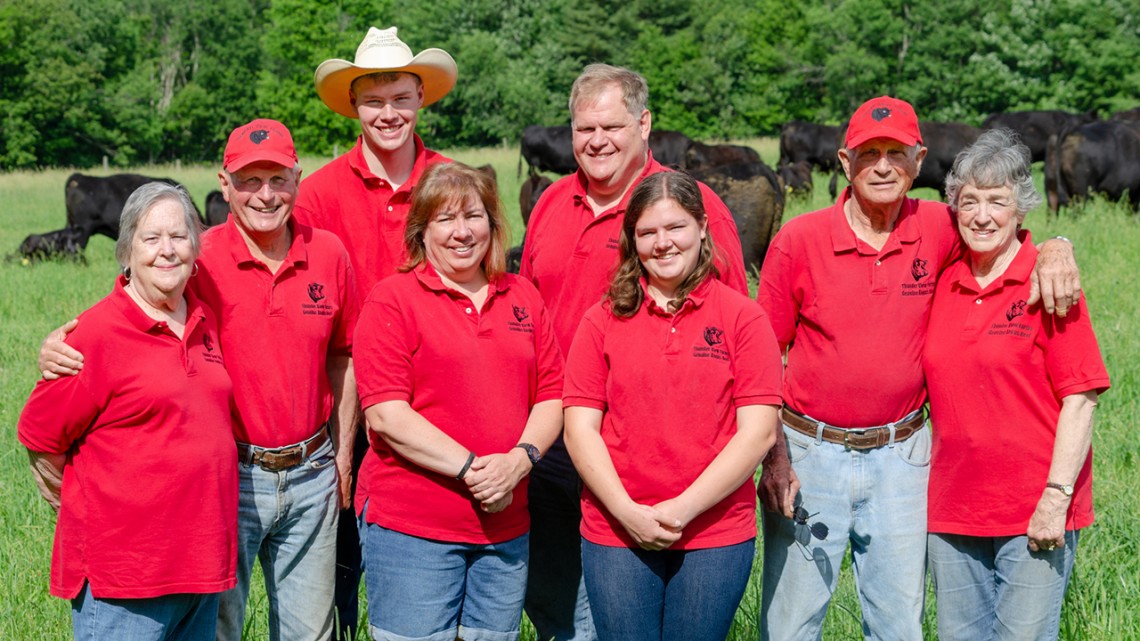
Members of the Coombe family – left to right, Phyllis ’64, Richard ’64, Patrick, Karen ’86, Ric ’91, Rebecca, Philip Jr. ’58 and Carolyn ’59 – at Thunder View Farms.
Upstate beef farm honored for efforts to keep NYC water clean
By Krisy Gashler
The story of Thunder View Farms is the story of reason, compromise and science-led decision-making winning the day.
When New York City proposed water regulations in the 1990s that would have driven most farms in its upstate watershed out of business, brothers Phil Coombe ’58 and Dick Coombe ’64 were operating their Catskill-region Angus beef operation. Dick was also a member of the New York State Legislature, and a group of Catskill farmers led by him partnered with Cornell to advocate for upstate farmers in negotiations with the city.
With the backing of Cornell scientists, the Catskill farmers convinced city water officials that there was a way to allow upstate farmers to keep farming while ensuring that drinking water for the city’s nearly 8 million residents could remain clean.
Thirty years later, that agreement remains in place, New York City continues to provide safe water to its residents, and Thunder View and hundreds of other farms in the watershed are still going strong.
In recognition of their dedication to excellence in both farm products and environmental practices, Thunder View Farms was chosen by the National Cattlemen’s Beef Association as the winner of its 2018 Environmental Stewardship Award. It’s the first time a New York farm has won in the prize’s nearly 30-year history.
“This is a Cornell success story,” Dick Coombe said. “Cornell was crucial in negotiating the original watershed agreement, Cooperative Extension is a major partner in watershed decision-making, and [College of Agriculture and Life Sciences] science is the basis for a lot of the environmental practices that we implement on the farm.”
The Coombe family, which operates the farm, boasts 12 Cornell graduates, 11 from CALS.
Thunder View Farms was one of the first upstate farms to adopt best management practices to prevent manure and pesticide runoff into waterways. Under the watershed agreement, New York City pays farms to adopt or install management practices that will keep the water clean.
Dick Coombe was founding chair and CEO of the Watershed Agricultural Council, a nonprofit board that serves as the governing link between city water officials and farmers. The council holds conservation easements on farmland, which establish owners’ rights to farm and conduct forestry practices, while requiring owners to use best management practices to protect the environment.
Paul Rush, deputy commissioner of the New York City Department of Environmental Protection, lauded the Coombe family for its efforts.
“Thunder View Farms and the Coombe family have been champions of environmental stewardship and eco-friendly farming practices for decades,” Rush said. “They were among the early program participants who showed their peers that efficient farming and watershed protection could coexist.
“Because of their example, more than 400 farms are now enrolled in these programs across the New York City watershed, allowing the largest city in the United States to maintain an unfiltered water supply,” he said. “The National Cattlemen’s Beef Association could not have picked a better farm to showcase environmental stewardship across the country.”
The Coombes have taken the challenge of a hilly landscape and turned it into an asset by installing an underground, gravity-fed, zero-electricity watering system, which enables them to rotate cattle in grazing areas more efficiently.
“With grazing, water is your limiting resource,” said Dick’s son, Ric Coombe ’91, the manager of the farm and part of the next generation of farm operators. “With this clean water system, we have water flowing without energy costs. The cattle are eating better and gaining more, while being fenced out of streams and wetlands, which keeps the water pure.”
The farm has also installed a host of green technologies, including solar panels and a wind turbine. Like the water that runs through their farm, some of the Coombes’ beef ends up in the kitchens of city residents 100 miles to the southeast.
“It’d be hard for the city to manage all of these lands,” Dick Coombe said. “Well-managed, privately owned land is a cheaper, better way for them to protect their water.”
Krisy Gashler is a freelance writer for the College of Agriculture and Life Sciences.
Media Contact
Get Cornell news delivered right to your inbox.
Subscribe

